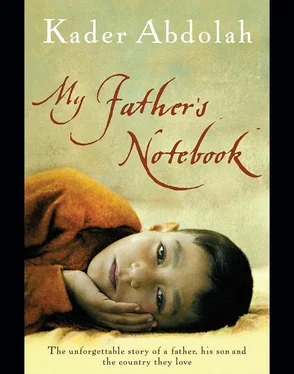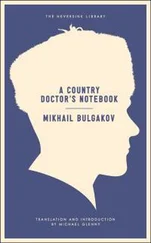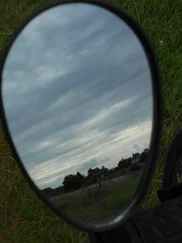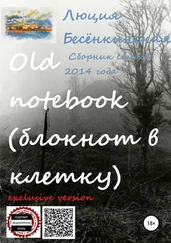“That one, too?” my father asked in surprise.
“Yes, the merchant’s parrot also dropped dead.”
“How did that happen?”
“Hold on. The man clutched his head. ‘Oh, my parrot, my poor parrot. I shouldn’t have told him.’ But there was nothing he could do, the parrot was dead. He took the lifeless body out of its cage and threw it on the rubbish heap. Suddenly the parrot began to move, and then it flew off. ‘Where are you going?’ the merchant cried. ‘Back home, back home, back home,’ the parrot replied.”
My father looked at me in surprise. At first he was silent, then he laughed out loud and signed, “Clever. The two parrots were very clever. A beautiful story. Beautiful.”
We stayed on the roof a bit longer. While I leafed through the books, he sat beside me, lost in thought.
“The looms,” he suddenly signed. “The looms in the factory are always going through my head, even in my sleep. I … I don’t know, but I wish I could … that I didn’t have to … the work gives me a headache, you know, and upsets my stomach.”
That was the first time he’d complained to me so clearly about his work. I could tell by his eyes that it wasn’t a foolish complaint but a cry for help.
“My throat hurts and is always swollen,” he continued. “Sometimes I can’t breathe, I suddenly have to gasp for air. I … I don’t want to go to the factory ever again, but I can’t quit, I’ve got four children to feed.”
I looked at his thin face and wondered what I could do to help him.
“The threads are always getting stuck in the machine,” he signed. “I try to watch. I look at them, but I don’t see them. Then the boss comes over and yells at me. Everybody stares and they all shake their heads and say that Akbar’s stupid. What do you think I should do?”
He’d asked me a clear question and I, Ishmael, needed to give him a clear answer. If I didn’t help him, who would? My duty was not to think of Tina and my sisters, but of Akbar. I’d been born to serve him, so I had to save him. Suddenly I knew what to do.
“You have to die,” I signed.
“What?”
“Die. Like the parrot. Fall down.”
He didn’t know what I meant.
“What do you mean? How? Fall down where?”
“Between the looms. Just keel over suddenly. Drop dead.”
The next day five factory workers carried my father home. They laid him on his deathbed and left.
He immediately opened his eyes, grabbed his cane and his carpet-mending gear and escaped into the mountains.
I wonder where he went.
Soon we’ll run into Marianne.
We’ll also get to know Golden Bell.
And we’ll knock on the door of Dr Pur Bahlul.

I’m going to save for a later chapter the subject of where my father went, what he did in the mountains and who he slept with during the months of his absence, because I don’t want to let my imagination run wild. That’s the reason I try to limit myself to actual events, to something that I myself have seen or heard or read in his notes. Consequently, I won’t be chasing through the mountains after my father in this chapter. Instead, I’m going to let him wander off and do whatever he pleases, sleep with whoever he wants and build up his strength again, because difficult times lie ahead. In other words, I’m going to leave him to his own devices for a while and tell another story until he gets back.
• • •
The summer is over, but a few days ago the weather suddenly turned hot again. There’s a lake about six miles from my house. I got out my bicycle and biked over to it, so I could swim and write in peace.
I went to the lake a lot this summer. I’d swim a lap, then roll out my mat and write.
The first time I went there was with Marianne, a woman I’d met two years ago in a literary café. She lived in Amsterdam, but was house-sitting for a friend. I’d noticed her before during the poetry nights at the café, without realising that she came to the polder especially for the poetry nights. She invariably read aloud the poems of famous dead poets. Thanks to her readings, I became acquainted with the masters of Dutch poetry, particularly J. C. Bloem. She’s the one who introduced me to the following poem:
In Memoriam
The weather changes, autumn is returning.
Leaves gild the water as they have before,
And fall to earth, down to the shadowy yearning
Of living hearts. He’ll see it nevermore.
How much he would have loved these dusky streets,
This atmosphere, befogged and sanctified,
Pavement, abandoned as the day retreats,
Turned damp and unfamiliar and wide.
But he was destined for the silent things
With which we live — not all of us so long—
The truths each heart expresses when it sings,
Until we sink, and with us sinks the song.
That season too was fall; the leaves return,
Though lives do not, once their brief day has fled.
We learned how cruelly human hearts can burn,
Standing in his still chamber, by the bed.
For me, this memory will not fade away:
So unlike sleep, death’s utter lack of sound.
Life is a miracle renewed each day,
And each awakening a new life found.
And now I find myself back in this blessed
Season of fallen leaves on water, gleaming
Like the pale sun of dead days laid to rest.
But how much longer shall I go on dreaming?
This weary life of toil leaves us breathless.
And what remains? What’s left worth longing for?
For him and me, an autumn that is deathless:
Sun, mist, and silence, and forever more.
I’ve included this poem in my book because of my father’s unexpressed longings. Marianne explained to me that J. C. Bloem was the poet of longing and that he’d once described himself as “divinely unfulfilled”.
Marianne also writes poems. I didn’t know that until one evening when I happened to stop by the café on a non-poetry night. She was sitting at a table, having a drink. She was my age and this was the first time I’d ever spoken to her without other people around.
“Look who’s here!” she said in a friendly voice. We began to talk and we’ve been friends ever since. I don’t know if “friends” is the right word to describe our relationship. Anyway, one day she said she was going to the lake and asked if I wanted to come along, too.
I didn’t know how to swim, but Marianne assured me I could learn.
“You have to learn!” she exclaimed. I went with her. The lake was in a quiet spot, and she and I were the only people there.
For one entire week we biked to the lake every day and Marianne taught me how to swim. On the last day she stood in the middle of the lake, spread her arms out wide and called, “Come!”
I swam and battled my way through the water until I reached her.
Then I clung to her and she clung to me.
Once more I laid my mat under the trees at the edge of the lake, in hope of getting some writing done. It was hot and muggy, so I thought, Why not go for a swim first? I waded into the water. It wasn’t the first time I’d gone swimming by myself. Once I’d even swum five laps. I swam calmly away from the shore, but before I’d gone even a hundred yards, I had a sudden panic attack. I turned and headed back to the shore, yet no matter how hard I swam, I didn’t seem to be going anywhere. I was seized with fear. I looked around, but there wasn’t a soul in sight. All my swimming skills were instantly forgotten. I shouted for help, then shouted again, sure that I was going to drown. As I sank, I thrashed around in the water. All of a sudden my foot touched bottom. One hard stroke, then another, and I could stand up.
Читать дальше













